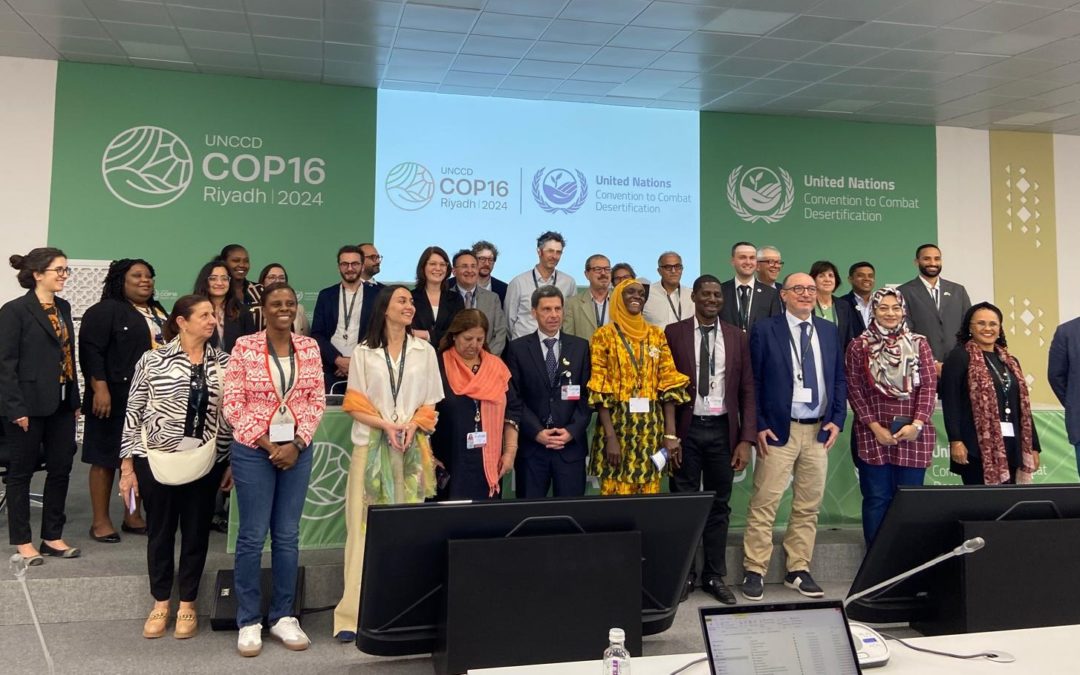The event was organized in collaboration between the PRIMA SALAM MED and WATDEV projects (EU Desire Initiative), and DesertNet International, the accredited network of scientists on desertification at UNCCD.
The theme of the meeting is the subject of lively international scientific debate. In recent decades, many international agencies like FAO and the World Bank, as well as national governments, have designed interventions to combat desertification fueled by the paradigm of “greening the desert,” with significant investments based on tree planting on the margins of deserts to halt their advance (e.g., the Great Green Wall in the Sahel or similar interventions in China).
The event, coordinated by Mauro Centritto of the CNR Italian National Research Council and representative for Western Europe of civil society organizations, was introduced by Hindou Oumarou Ibrahim, President of the Indigenous Women’s Association of Chad, who offered her perspective on sustainable water resource management in arid lands, and the role of indigenous communities, particularly women, in the recovery of degraded ecosystems associated with sustainable community development. “Science in this context offers effective tools (e.g., participatory GIS) for active engagement of local communities in decisions about the future of their territories.”
The first speaker of the session, Matthew D. Turner from Wisconsin University, presented a range of evidence from the international scientific literature showing that in many cases these investments not only largely failed to meet their goals but often had negative impacts on climate, biodiversity, and local communities. In particular, Prof. Turner raised a series of open questions about the “arbor-centric” vision, according to which “planting trees” is always a good thing.
Mamadou Koutou, representative of the African Union and SAFGRAD initiative, with direct experience of the African Great Green Wall project in Burkina Faso, corroborated Prof. Turner’s hypotheses with a series of evaluation statistics of past interventions, which at best were ineffective against expectations. From the initial idea in 2005, ideas and visions have evolved, and today the African Union is committed to a turnaround for the next decade, considering the close link between ecosystem recovery and community well-being. A series of independent evaluations showed that, by 2020, goals were achieved in only about 10% of affected areas and had only 3.5% of the expected impact on employment in the concerned nations. Areas of improvement include governance aspects, investment in local human capital, and active engagement of local communities, as well as specific technical aspects.
The two initial interventions were followed by presentations from the PRIMA Salam MED (Pier Paolo Roggero, University of Sassari) and WATDEV (Aymen Awassi, CIHEAM Bari) research projects. Salam MED proposes approaches aimed at creating business opportunities linked to soil fertility improvement, a prerequisite for sustainable development in arid zones. “The ‘living lab’ approach, promoted by the European Union, was never cited in the context of COP16,” said Roggero. Salam MED is experimenting with its effectiveness and implications in six different situations in the Mediterranean basin aimed at restoring degraded soils in North Africa and increasing recovery capacity in areas threatened by desertification in southern Europe. The living labs allowed for the integration of scientific and local knowledge to identify practical solutions well-suited and easily adoptable by local communities, especially young people and women.
The WATDEV project developed an integrated “bottom-up” and “top-down” approach based on various modeling applications that allow the simulation with the utmost precision of the impacts of climate change and different agronomic management options on hydrology and soil fertility in arid zones. These tools, used in combination with participatory approaches, provide monitoring and evaluation tools for environmental restoration and agricultural ecosystem interventions that significantly increase the success rates of desertification control projects.
The discussion panel was opened by Anna Luise, chair of the “Committee of the Whole” at COP16, who emphasized the importance of integrated approaches to combat desertification, driven by both scientific and local knowledge, and an effective science-policy interface to support choices even in delicate negotiating phases between the Convention’s member countries. Nausheen Mazhar, a professor at the Women’s University of Lahore in Pakistan, highlighted the strong demographic pressure in a country with over 350 million inhabitants where rainfall averages less than 300 mm annually, and the need to offer adequate support to countries most affected by climate change impacts due to greenhouse gas emissions. Bouchaou Lhoussaine, professor at the Mohammed VI Polytechnic University of Rabat in Morocco, provided concrete examples of how to harness unconventional water sources, including urban wastewaters, not only for urban green spaces but also for irrigation in arid zones.

